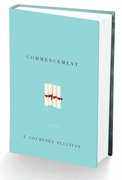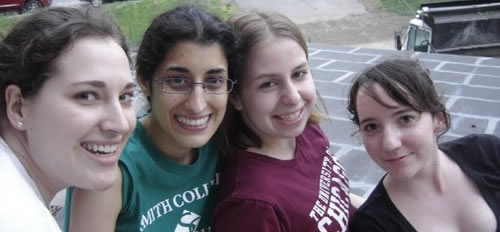|
Jennifer DeBerardinis '11 reviews “Commencement," the
novel by alumna J. Courtney Sullivan '03, which has garnered a lot of attention — from
mainstream media and Smithies alike — since hitting bookstores June 16.
 They’ve
moved far, far away from their four-year retreat in Smith College's King House—Celia a
floundering writer, Bree a successful attorney in love with a Smith classmate, Sally
a mother to be, and April—ever the rebel—deployed to the frontline of
the fight for women’s rights. Even Celia admits their life paths have taken
turns they’d never imagined as first-years, gossiping in the King-Scales dining
room over dinner nearly a decade earlier. In those days, Southern belle Bree was
engaged to the man of her dreams, Sally falling for a brilliant professor-poet, April
organizing Celebration and every rights rally on campus, and Celia providing the
emotional glue to keep the foursome stuck together. Five years after graduation,
though, their friendship is fading, and the turbulent year surrounding Sally’s
divisive wedding threatens to cut their once immutable Smithie ties. They’ve
moved far, far away from their four-year retreat in Smith College's King House—Celia a
floundering writer, Bree a successful attorney in love with a Smith classmate, Sally
a mother to be, and April—ever the rebel—deployed to the frontline of
the fight for women’s rights. Even Celia admits their life paths have taken
turns they’d never imagined as first-years, gossiping in the King-Scales dining
room over dinner nearly a decade earlier. In those days, Southern belle Bree was
engaged to the man of her dreams, Sally falling for a brilliant professor-poet, April
organizing Celebration and every rights rally on campus, and Celia providing the
emotional glue to keep the foursome stuck together. Five years after graduation,
though, their friendship is fading, and the turbulent year surrounding Sally’s
divisive wedding threatens to cut their once immutable Smithie ties.
What finally endears the young women to each other
belongs as much to “Commencement” author J. Courtney Sulilvan ’03
as to her uncannily vivid characters: an unapologetic, unwavering Smithie-ness that
conquers the greatest distances and most minatory friendship rifts.
Sullivan herself likened the compelling novel to a
love letter—made out of Smith, of course, and the friendships, traditions,
and unshakable school spirit that define the four years that us lucky few get to
enjoy here. For Smithie readers, it’s a reaffirmation of the reasons we chose
to attend Smith (big single rooms), the reasons we’re in love with it (having
friends as loyal as Celia and admirable as April), and the reasons we will be at
the same time horrified and thrilled to graduate. If Celia, Bree, Sally, and April
are any example, we can take heart in the continuity of Smithie-ness; commitment
to college love will only grow after that fateful May day when we’re kicked
off of Paradise Road and into the real world, no matter how far from Northampton
we stray.
“Commencement” delivers more than pretty
love odes to Sullivan’s alma mater, though. The author moves beyond neatly
packaged friendship-conquers-all themes with the weighty—and definitively unanswerable—questions
that face young women today. Among these are how to achieve a balance between career
and family, define sexuality amid black-and-white societal expectations, and figure
out just how far is too far in sticking up for one’s beliefs. In the end, Sullivan
shows, Smith doesn’t force feed students those answers. It gives grads the
fortitude to decide for themselves.
Even so, Sullivan is too timid to confront some issues
she hesitantly broaches: Celia’s excessive drinking and indifference to people
around her, April’s inability to say no. In the end, though, we’re
contented with the knowledge that surviving Smith means surviving anything: a baby,
an abusive boss, a family that doesn’t accept the person you love.
Many of us delight in the reputation that Smithies can
save the world and be home in time for 4 p.m. tea. During a discussion about “Commencement”,
a friend of mind remarked that the novel’s depiction of post-college life is
depressing—will we really be stuck with unsavory editing jobs when
all we want to do is write great literature? Or have to choose between family and
the person we love? But Sullivan’s post-Smith life is comforting in its realism;
Celia, Bree, April, and Sally have done nothing overtly revolutionary, but their
commitment to one another and to finding themselves in a world not often conducive
to either pursuit is as honorable as it gets. For an even more impressive example
of what a Smithie is capable of, just read Sullivan’s short biography on the
back cover.
Of course, a good Smith novel has to include a few
stereotypes—the BDOCs (big dykes on campus) and SLUGS (Smith lesbians until
graduation; we love our acronyms), the girls who’ve let themselves go, the
lie prospective students hear year after year: “You will meet men
here” and the few diehard believers who still venture to Amherst parties. And
reading about the campus’s most honored traditions-Celebration, Immorality,
afternoon tea—is undeniably fun. More deeply, though, for alumnae and current
Smithies alike, Sullivan’s work serves as a refreshing meditation on the quirky
and cherished school so unique it often defies description. To know Smith is to live
it. Sullivan deserves much praise for so vividly capturing that life in just over
300 pages.
 The
reviewer The
reviewer
DeBerardinis, of Glendale, Maryland, is currently working in a biochemistry lab
at the University of California San Fransico as part of an undergraduate summer
research program. "It's definitely different here, and I've gotten a little
Smith-sick, but a great experience overall," said DeBerardinis, a biological
sciences and philosophy major. "I'm learning a lot of new research techniques
and trying to figure out what to do with my life."
Additional reviews
NEW
YORK DAILY NEWS, July 5, Chick-lit Confections
CONNECTICUT
POST, June 26, 'Commencement' Follows Four Friends
METRO
INTERNATIONAL, June 22, Telling Tales Out of School
BOSTON
GLOBE, June 20, Telling Women's Stories
THE
FRISKY, June 18, Crave 'Commencement'
NEW
YORK OBSERVER, June 18, Sullivan's Travels
NEW
YORK TIMES, June 12, The Girls of Summer
NEW
YORK TIMES, June 12, Sunday Book Review

The reviewer near Scales House with her Smithie friends.
From left to right, Cece Vayda '10, Samantha Torquato '11, Jennifer DeBerardinis
'11, Erin King '11.
-30-
|
|
Current
News &
Events
News
Release
Archive |























